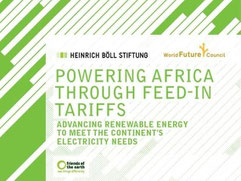News

Berlin, 14. Feb. 2013 - Der Erste „2013 African Ambassadors Dialogue with Business“ am 14. Februar im Haus der Deutschen Wirtschaft in Berlin war ein voller
Erfolg.
100 Botschaftsvertreter aus 48 afrikanischen Ländern, die 99 Prozent der Wirtschaftskraft des afrikanischen Kontinents repräsentieren, und 300 deutsche Wirtschaftsvertreter waren der Einladung
gefolgt. Die große Teilnehmerzahl überbot die Erwartungen der Veranstalter bei weitem. Gemeinsam von den afrikanischen Botschaften in Berlin und der deutschen Wirtschaft organisiert, bot die
Veranstaltung Unternehmensvertretern die Möglichkeit, Kontakte mit afrikanischen Botschaftern und Botschaftsvertretern aufzunehmen oder auszubauen.

February 2013 - Study: Powering Africa through Feed-in Tariffs
Advancing renewable energy to meet the continent’selectricity needs
A Study for the World Future Council (WFC), the Heinrich Böll Stiftung (HBS) and Friends of the Earth England, Wales & Northern Ireland (FoE-EWNI).
Africa is facing an energy crisis: the existing production capacity cannot meet the growing demand for electricity. The electricity needed to power and grow the economy, drive local development and tackle urban and rural poverty is simply not there. In addition, traditional sources have become unreliable, unaffordable or increasingly unacceptable.
Energy has been described as the ‘missing millennium development goal’ that enables others to be achieved, yet according to the World Bank less than 25% of Sub-Saharan households have access to
electricity, falling to 10% in rural areas. The traditional energy solution has relied on fossi fuels, yet not only are they becoming unaffordable, but their historic consumption by rich,
industrialised nations is driving dangerous climate change. On the continent that has done least to cause it, the effects are already evident, increasing the frequency and severity of floods and
droughts and impacting people’s livelihoods.
This has also undermined the generation capacity of one of the continent’s major energy sources –hydropower, which has also come under pressure because of its negative impacts on people and
ecosystems.

Commerzbank-Studie: Renaissance in Subsahara-Afrika
1. Die wichtigsten Aussagen im Überblick:
- Auch wenn in einigen Staaten noch Defizite bei der Demokratieund der Effizienz der politischen Institutionen bestehen, hat die politische und wirtschaftliche Stabilität in Subsahara-Afrika insgesamt zugenommen. Einige Länder haben große Fortschritte in den Bereichen Bildung, Korruptionsbekämpfung und Investitionsklima erzielt.
- Der Schwenk zu stabilitätsorientierterer Wirtschaftspolitik und natürlich der Rohstoffboom haben die Krisenresistenz vieler Länder Subsahara-Afrikas erhöht. So verzeichnen einige von ihnen nennenswerte Überschüsse in Leistungsbilanz und im Staatshaushalt. Parallel dazu sind die Devisenreserven gestiegen.
- Das verarbeitende Gewerbe dürfte sich auf die Weiterverarbeitung bergbaulicher und landwirtschaftlicher Rohstoffe konzentrieren. Der zunehmende Wertschöpfungsanteil macht die Länder von Rohstoffpreisschwankungen unabhängiger.
- ...
> to continue > Download - Commerzbank-Studie - PDF-Document

 African Business and Project Management
African Business and Project Management


